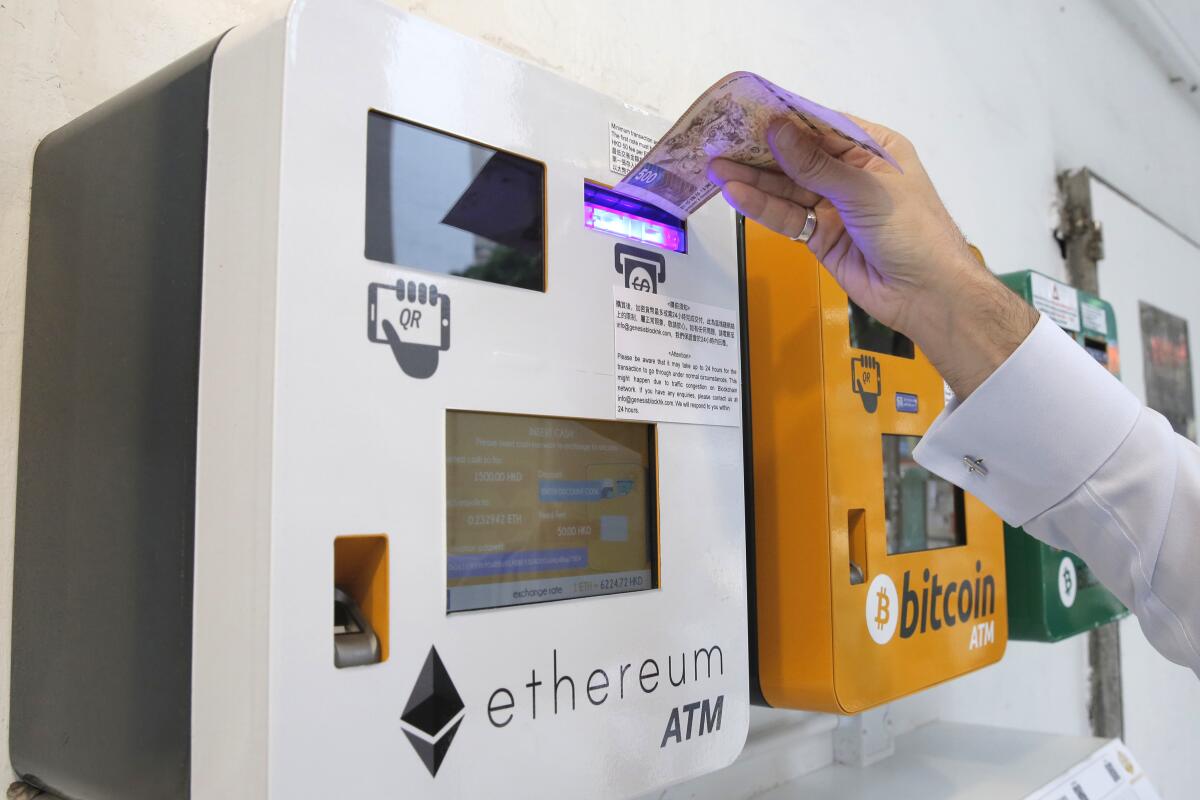Crypto trading just got safer, and that’s too bad

- Share via
Something called the “London hard fork” is going down.
If you picture a two-pronged implement jabbing into a pub steak, you have some catching up to do. This has nothing to do with London broil.
Instead, the London hard fork is the insider-y (and admittedly cool-sounding) name of the first phase of a gut renovation to the Ethereum blockchain. It started Thursday in London.
The Ethereum blockchain is one of the most established of the digital ledgers that keep track of cryptocurrency all over the world. So the London hard fork is an upgrade to accounting software.
That sounds trivial. But the London hard fork has significant philosophical implications. It suggests that cryptocurrencies such as bitcoin and dogecoin might be growing up.
So it is time to pay attention — even if you still think crypto is mostly for teenagers with ballpoint tattoos.
The first consequence of the London hard fork is that it will make it easier to buy and sell cryptocurrency. The accounting will be more efficient. Imagine a credit card that processes your purchases faster, with lower fees.
The upgrade is also intended to reduce the supply of Ethereum’s crypto coin, which is called ether, and to drive up its price. Overall, it could be an advantage for investors, but a disadvantage for “miners” whose digital machinations put more such coin into circulation.
In any case, the market seems to approve of Ethereum’s move. Ether saw a bounce soon after the upgrade took effect yesterday.
But the hard fork is raising eyebrows among crypto obsessives, especially those who cherish the blockchain as a massive experiment in fully decentralized governance. Some of them see it as a harbinger of something sinister.
They don’t like the idea of a top-down power shifting the way the blockchain and the value of crypto works. Changes to the system, in this view, should be hashed out by the innumerable little guys who use the blockchain. Many of the smaller players would rather accept “regulation” from zillions of trolls on zillions of subreddits than by an organization like the Federal Reserve. Or the U.S. Treasury. Or the Ethereum Foundation.
On Hacker Noon, a popular blog about financial tech and crypto, an article in June called out Ethereum for abandoning crypto’s first principle: decentralization. “Ethereum, You Are A Centralized Cryptocurrency,” the headline read. “Stop Telling Us That You Aren’t.”
Bitcoin.com has long warned that centralization is creeping in everywhere in cryptocurrency: “Many crypto projects behave just like the financial institutions they were meant to replace.”
Actually, with the London hard fork, the Ethereum blockchain will be only minimally more overseen. Trading will continue to be a lot like pulling the lever in some kind of peer-to-peer casino, trying to get three bunches of cherries.
But the most intense crypto traders do care about the principles behind decentralized currencies like bitcoin and ether (the two biggest, by market value). What’s to keep the Ethereum Foundation from becoming just another central bank, making “upgrades” upon “upgrades” to their system, until they’re setting the digital equivalent of interest rates and controlling supply the way banks and nations do?
I have to confess I share some of this concern. I’m a believer in crypto. Sure, it’s a young person’s game. But it’s not every day you get a chance to be part of something that’s brand new, philosophically challenging and plain fun.
The crypto gamble I most enjoy is the risk taken by my brain in trying to understand it. I’ve certainly sunk more brain cells than dollars into the crypto proposition.
But there’s more to the allure of trading crypto. Politically, I favor a democracy, with a sound federal government that provides for the safety, health and well-being of a nation. But personally I like fewer guardrails. I generally prefer swaths of uncharted territory to Disneyland.
I’ve had some luck investing in dogecoin, a silly cryptocurrency that surged when Elon Musk promoted it on Twitter and “Saturday Night Live,” but which has lately been in freefall. (To my amazement, my household got out just in time.)
So count me among those wary of the overhaul going on at Ethereum. I get that it means ether may enjoy more stability. But we can’t pretend that it’s not a blow to the dream of a fully decentralized currency, one that is beholden to no government, bank or central authority.
The good news is that the London hard fork is indeed a fork. Two roads are diverging. Ethereum is not insisting on one right way; it’s offering an option. You can trade ether the old-fashioned less-regulated way, or you can go over to slightly-more-regulation.
We in the old guard have to be thankful for that, although lamentably if unsurprisingly most investors are expected to sign on with the upgrade. They may be financial risk takers but they’re willing to exchange the Wild West of currency markets for more regulation. We’ve seen it before: Sometimes free people choose repression — up to and including tyranny.
Crypto may be revolutionizing currency markets, but it’s not changing the infinite paradoxes in human nature, at least not yet.
More to Read
A cure for the common opinion
Get thought-provoking perspectives with our weekly newsletter.
You may occasionally receive promotional content from the Los Angeles Times.









